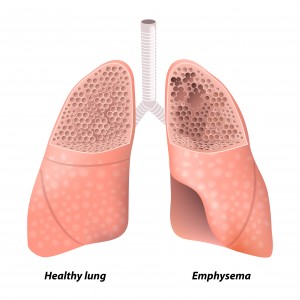 Researchers at the Johns Hopkins University School of Medicine recently revealed a link between certain lung diseases and individuals whose telomeres in the chromosomes of lung stem cells are not functioning properly. The study was published in the journal Proceedings of the National Academy of Sciences and is entitled “Telomere dysfunction causes alveolar stem cell failure.”
Researchers at the Johns Hopkins University School of Medicine recently revealed a link between certain lung diseases and individuals whose telomeres in the chromosomes of lung stem cells are not functioning properly. The study was published in the journal Proceedings of the National Academy of Sciences and is entitled “Telomere dysfunction causes alveolar stem cell failure.”
Lung diseases like pulmonary fibrosis and emphysema, both characterized by damage to the lung alveoli (tiny air exchange sacs) and inflammation that compromises oxygen transfer and can lead to severe breathing difficulties, are often detected in individuals with malfunctioning telomeres. Telomeres are the caps at the end of each DNA strand that protect the edge of the chromosomes from degradation and from fusion with other chromosomes.
The research team found that some stem cells (cells with the potential to differentiate into several specialized cell types) in the lung alveoli undergo premature aging when their telomeres are defective, stopping their division and proliferation. Using these isolated alveoli stem cells and rodent models, the research team found that the senescent or dormant stem cells release signals that recruit immune molecules to the lungs leading to a severe inflammation, a feature characteristic of several lung diseases.
Up to this point, the scientific and medical community thought that “inflammation alone is what drives these lung diseases and have based therapy on anti-inflammatory drugs for the last 30 years,” said one of the study authors Dr. Mary Armanios in a news release. Now, based on these new findings “if it’s premature aging of the stem cells driving this, nothing will really get better if you don’t fix that problem,” noted Dr. Armanios. “It’s a new challenge that begins with the questions of whether we take on the effort to fix this defect in the cells, or try to replace the cells,” Currently, there are no means to fix or replace damaged lung stem cells.
[adrotate group=”3″]
The research team also found that this telomere-driven defect in stem cells causes mice models to become extremely susceptible to anticancer drugs like busulfan or bleomycin, known to be toxic for the lungs. This effect is probably related to the fact that due to telomere dysfunction, lung stem cells cannot divide and replenish the destroyed lung cells. When these anticancer drugs were given to mice with the lung stem cell defect, all animals became severely ill and died within a month.
This finding may explain why “sometimes people with short telomeres may have no signs of pulmonary disease whatsoever, but when they’re exposed to an acute infection or to certain drugs, they develop respiratory failure,” noted Dr. Armanios. “We don’t think anyone has ever before linked this phenomenon to stem cell failure or senescence.”
“In bone marrow or other compartments, when stem cells have short telomeres, or when they age, they just die out,” explained Dr. Armanios. “But we found that instead, these alveolar cells just linger in the senescent stage.” Different from other stem cells, lung stem cells with defective telomeres in the genetically engineered mice stayed alive, although they were unable to divide and regenerate the epithelial lining in the lung alveoli.
The research team plans to assess in the future whether cigarette smoke, an important risk factor for the development of emphysema and several other lung diseases, may be associated with a defect in lung stem cells.

